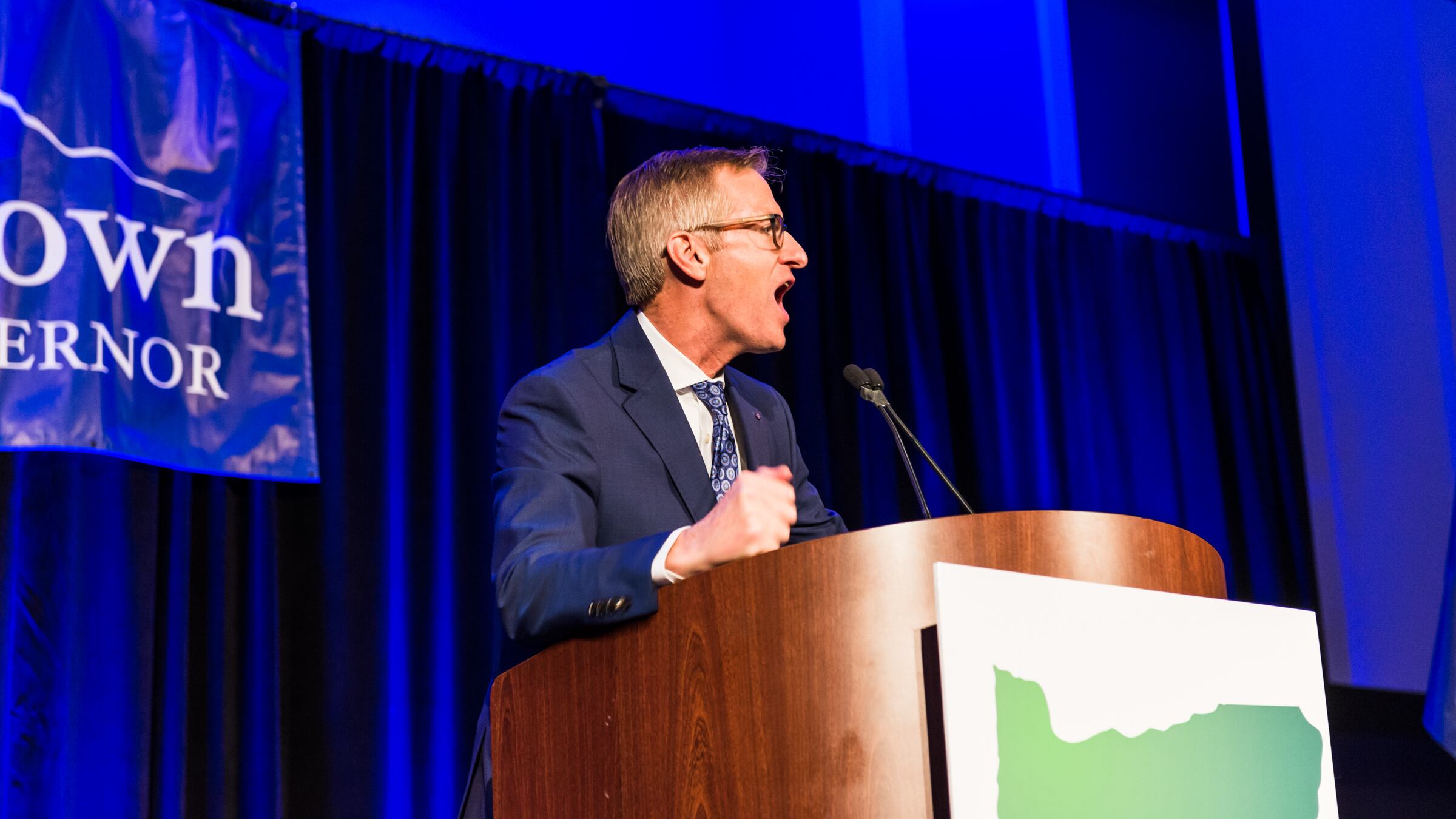Portland Mayor Ted Wheeler can make a case for being a leading figure of the anti-Trump resistance.
He's the top politician in a deep-blue city in the midst of a blue state. This summer, he refused for weeks to deploy cops to disband a protest at the offices of U.S. Immigration and Customs Enforcement, earning him the ire of the right wing. He's been pilloried on Fox News and right-wing talk radio.
Over the past six weeks, Wheeler has tried to end the alarmingly violent street protests sparked by out-of-state Trump supporters. And last week, he attempted but failed to pass an ordinance through the City Council that would have given police more tools to restrict on the protests.
Though that effort fizzled, he did finish last week on a high note when, over the weekend, his police force calmly handled another round of dueling protesters.
But his behavior shows odd parallels to the Trump era he is defying. The day after Wheeler failed to pass his ordinance, he made news with a grumble: "I cannot wait for the next 24 months to be up."
"It's a very publicly tough week for him," says Jim Moore, professor of political science at Pacific University. "There are times when the job doesn't seem worth it."
Here are five key moments that show the pressures the mayor faces—and how those pressures are affecting his decisions.

1. Ted Wheeler was prickly about what he saw on cable TV.
On Oct. 9, Fox News ran an eight-minute segment that labeled Wheeler a "cowardly mayor" for his alleged failure to enforce the law. "The mayor's a nutcase," Fox News piled on.
The proximate cause was a conflict between protesters and a Lexus, whose driver had pushed through the crowd. The larger context was Wheeler's refusal to clear out the anti-ICE blockade in June.
Wheeler claimed not to care about his own image but instead defended the police. "I'm willing to take criticism all day long from Fox News, but I am not willing to accept criticism from Fox News of the men and women of the Portland Police Bureau," he said.
On Oct. 15, after more national news stories on yet another street brawl, he rushed his protest ordinance out the door, giving colleagues only two hours' notice.
Jim Pasero, director of the conservative group ActionPAC, says Wheeler had seen the TV clips and felt a need to respond: "He's a pretty proud guy. He doesn't want to be a laughingstock."

2. Wheeler battled with users on Twitter.
On Oct. 18, civil liberties advocates met with the mayor to propose a series of fixes to the city's street brawls between right-wing extremists and Antifa, rather than the measure he was supporting (which ended up failing for lack of support from city commissioners who were worried Wheeler's proposal was unconstitutional). Their alternative proposals included educating the police, the press and others about the dangers and tactics of white supremacists.
In an extraordinary break from past practices, the mayor didn't express gratitude to the advocates who came his way or suggest he would work with them in the future on their suggestions. Those are the typical "Portland polite" ways of blowing off critics.
Instead, he publicly criticized American Civil Liberties Union of Oregon lawyer Mat dos Santos. He compared dos Santos unfavorably with a lawyer who supported the mayor's proposal. "Calling you out on this one," Wheeler tweeted, adding that the other lawyer had "a higher profile and with a successful history of defending the constitutionality of time, manner and place restrictions."

3. Wheeler didn't bother with traditional politics.
The mayor of Portland needs to be able to count to three: the number of votes required to pass a city ordinance.
And yet it is very clear Wheeler never had the support needed for his ordinance to control violent protests but decided to bring it to a vote anyway. He does not appear to have consulted fellow commissioners before announcing the ordinance.
The mayor knew he didn't have the votes, but his staffers say they wanted to show supporters of law and order that the mayor wouldn't cave. "I am encouraged that this has sparked a necessary and hard look at protest safety in our city," said Wheeler in a statement immediately after the vote. At the same time, say City Hall observers, not compromising looks a lot like giving up.

4. Wheeler blamed the media.
When Wheeler announced his ordinance, it wasn't difficult for reporters to find legal experts critical of the measure and its constraints on free speech. The Oregonian reported Wheeler's first draft was "blatantly, dangerously unconstitutional."
When the measure failed to get enough votes at City Hall, Wheeler turned on the news media and blamed them. "If you put an ordinance out there and there is any question about its legality, make sure your lawyers get to the media first, because once that frame is set, it is very, very hard to turn that frame around," Wheeler said.
To many observers, Wheeler, by blaming others, was showing weakness. Wheeler says he respects the press: "Journalists play an essential role in our political discourse, challenging elected leaders to be better and to explain more thoroughly."

5. Wheeler ended back where he started.
The week ended on a much stronger note for Wheeler—because his police force learned from its mistakes and tried new tactics. On Nov. 17, police went back to the streets to confront extremists—and succeeded in preventing violence.
ACLU of Oregon's Kimberly McCullough acknowledged the protest had "a better outcome" but also proved critics' point: "This weekend confirmed that the proposed protest ordinance was completely unnecessary." Now Wheeler finds himself much where he started—Fox News again did a segment decrying violence at Portland protests, but this time without mentioning the mayor.

